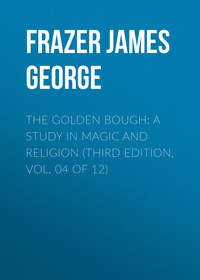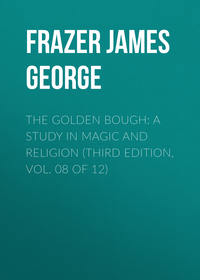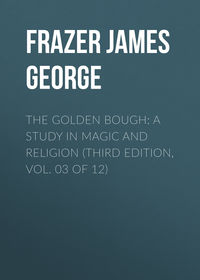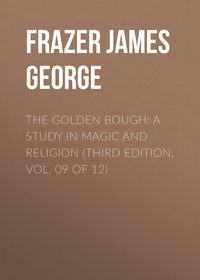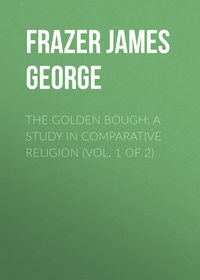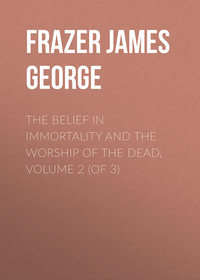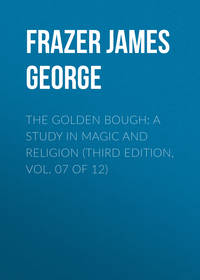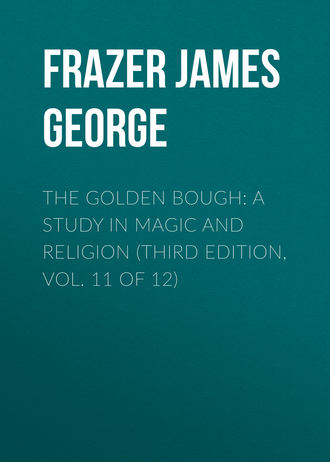 полная версия
полная версияThe Golden Bough: A Study in Magic and Religion (Third Edition, Vol. 11 of 12)
Cashmeer stories of ogres whose lives were in cocks, a pigeon, a starling, a spinning-wheel, and a pillar. Cashmeer and Bengalee stories of ogres whose lives were in bees.
In a Cashmeer story a lad visits an old ogress, pretending to be her grandson, the son of her daughter who had married a king. So the old ogress took him into her confidence and shewed him seven cocks, a spinning wheel, a pigeon, and a starling. “These seven cocks,” said she, “contain the lives of your seven uncles, who are away for a few days. Only as long as the cocks live can your uncles hope to live; no power can hurt them as long as the seven cocks are safe and sound. The spinning-wheel contains my life; if it is broken, I too shall be broken, and must die; but otherwise I shall live on for ever. The pigeon contains your grandfather's life, and the starling your mother's; as long as these live, nothing can harm your grandfather or your mother.” So the lad killed the seven cocks and the pigeon and the starling, and smashed the spinning-wheel; and at the moment he did so the ogres and ogresses perished.326 In another story from Cashmeer an ogre cannot die unless a particular pillar in the verandah of his palace be broken. Learning the secret, a prince struck the pillar again and again till it was broken in pieces. And it was as if each stroke had fallen on the ogre, for he howled lamentably and shook like an aspen every time the prince hit the pillar, until at last, when the pillar fell down, the ogre also fell down and gave up the ghost.327 In another Cashmeer tale an ogre is represented as laughing very heartily at the idea that he might possibly die. He said that “he should never die. No power could oppose him; no years could age him; he should remain ever strong and ever young, for the thing wherein his life dwelt was most difficult to obtain.” It was in a queen bee, which was in a honeycomb on a tree. But the bees in the honeycomb were many and fierce, and it was only at the greatest risk that any one could catch the queen. However, the hero achieved the enterprise and crushed the queen bee; and immediately the ogre fell stone dead to the ground, so that the whole land trembled with the shock.328 In some Bengalee tales the life of a whole tribe of ogres is described as concentrated in two bees. The secret was thus revealed by an old ogress to a captive princess who pretended to fear lest the ogress should die. “Know, foolish girl,” said the ogress, “that we ogres never die. We are not naturally immortal, but our life depends on a secret which no human being can unravel. Let me tell you what it is, that you may be comforted. You know yonder tank; there is in the middle of it a crystal pillar, on the top of which in deep waters are two bees. If any human being can dive into the waters, and bring up to land the two bees from the pillar in one breath, and destroy them so that not a drop of their blood falls to the ground, then we ogres shall certainly die; but if a single drop of blood falls to the ground, then from it will start up a thousand ogres. But what human being will find out this secret, or, finding it, will be able to achieve the feat? You need not, therefore, darling, be sad; I am practically immortal.” As usual, the princess reveals the secret to the hero, who kills the bees, and that same moment all the ogres drop down dead, each on the spot where he happened to be standing.329 In another Bengalee story it is said that all the ogres dwell in Ceylon, and that all their lives are in a single lemon. A boy cuts the lemon in pieces, and all the ogres die.330
The external soul in a Siamese or Cambodian story. Indian stories of a tree and a barley plant that were life-tokens.
In a Siamese or Cambodian story, probably derived from India, we are told that Thossakan or Ravana, the King of Ceylon, was able by magic art to take his soul out of his body and leave it in a box at home, while he went to the wars. Thus he was invulnerable in battle. When he was about to give battle to Rama, he deposited his soul with a hermit called Fire-eye, who was to keep it safe for him. So in the fight Rama was astounded to see that his arrows struck the king without wounding him. But one of Rama's allies, knowing the secret of the king's invulnerability, transformed himself by magic into the likeness of the king, and going to the hermit asked back his soul. On receiving it he soared up into the air and flew to Rama, brandishing the box and squeezing it so hard that all the breath left the King of Ceylon's body, and he died.331 In a Bengalee story a prince going into a far country planted with his own hands a tree in the courtyard of his father's palace, and said to his parents, “This tree is my life. When you see the tree green and fresh, then know that it is well with me; when you see the tree fade in some parts, then know that I am in an ill case; and when you see the whole tree fade, then know that I am dead and gone.”332 In another Indian tale a prince, setting forth on his travels, left behind him a barley plant, with instructions that it should be carefully tended and watched; for if it flourished, he would be alive and well, but if it drooped, then some mischance was about to happen to him. And so it fell out. For the prince was beheaded, and as his head rolled off, the barley plant snapped in two and the ear of barley fell to the ground.333 In the legend of the origin of Gilgit there figures a fairy king whose soul is in the snows and who can only perish by fire.334
The external soul in Greek stories. Meleager and the firebrand. Nisus and his purple or golden hair. Pterelaus and his golden hair. Modern Greek parallels. The external soul in doves.
In Greek tales, ancient and modern, the idea of an external soul is not uncommon. When Meleager was seven days old, the Fates appeared to his mother and told her that Meleager would die when the brand which was blazing on the hearth had burnt down. So his mother snatched the brand from the fire and kept it in a box. But in after-years, being enraged at her son for slaying her brothers, she burnt the brand in the fire and Meleager expired in agonies, as if flames were preying on his vitals.335 Again, Nisus King of Megara had a purple or golden hair on the middle of his head, and it was fated that whenever the hair was pulled out the king should die. When Megara was besieged by the Cretans, the king's daughter Scylla fell in love with Minos, their king, and pulled out the fatal hair from her father's head. So he died.336 Similarly Poseidon made Pterelaus immortal by giving him a golden hair on his head. But when Taphos, the home of Pterelaus, was besieged by Amphitryo, the daughter of Pterelaus fell in love with Amphitryo and killed her father by plucking out the golden hair with which his life was bound up.337 In a modern Greek folk-tale a man's strength lies in three golden hairs on his head. When his mother pulls them out, he grows weak and timid and is slain by his enemies.338 Another Greek story, in which we may perhaps detect a reminiscence of Nisus and Scylla, relates how a certain king, who was the strongest man of his time, had three long hairs on his breast. But when he went to war with another king, and his own treacherous wife had cut off the three hairs, he became the weakest of men.339 In another modern Greek story the life of an enchanter is bound up with three doves which are in the belly of a wild boar. When the first dove is killed, the magician grows sick; when the second is killed, he grows very sick; and when the third is killed, he dies.340 In another Greek story of the same sort an ogre's strength is in three singing birds which are in a wild boar. The hero kills two of the birds, and then coming to the ogre's house finds him lying on the ground in great pain. He shews the third bird to the ogre, who begs that the hero will either let it fly away or give it to him to eat. But the hero wrings the bird's neck, and the ogre dies on the spot.341 In a variant of the latter story the monster's strength is in two doves, and when the hero kills one of them, the monster cries out, “Ah, woe is me! Half my life is gone. Something must have happened to one of the doves.” When the second dove is killed, he dies.342 In another Greek story the incidents of the three golden hairs and three doves are artificially combined. A monster has on his head three golden hairs which open the door of a chamber in which are three doves: when the first dove is killed, the monster grows sick; when the second is killed, he grows worse; and when the third is killed, he dies.343 In another Greek tale an old man's strength is in a ten-headed serpent. When the serpent's heads are being cut off, he feels unwell; and when the last head is struck off, he expires.344 In another Greek story a dervish tells a queen that she will have three sons, that at the birth of each she must plant a pumpkin in the garden, and that in the fruit borne by the pumpkins will reside the strength of the children. In due time the infants are born and the pumpkins planted. As the children grow up, the pumpkins grow with them. One morning the eldest son feels sick, and on going into the garden they find that the largest pumpkin is gone. Next night the second son keeps watch in a summer-house in the garden. At midnight a negro appears and cuts the second pumpkin. At once the boy's strength goes out of him, and he is unable to pursue the negro. The youngest son, however, succeeds in slaying the negro and recovering the lost pumpkins.345
The external soul in Italian stories. Silvia's son. The dragon twin. The soul in a gem.
Ancient Italian legend furnishes a close parallel to the Greek story of Meleager. Silvia, the young wife of Septimius Marcellus, had a child by the god Mars. The god gave her a spear, with which he said that the fate of the child would be bound up. When the boy grew up he quarrelled with his maternal uncles and slew them. So in revenge his mother burned the spear on which his life depended.346 In one of the stories of the Pentamerone a certain queen has a twin brother, a dragon. The astrologers declared at her birth that she would live just as long as the dragon and no longer, the death of the one involving the death of the other. If the dragon were killed, the only way to restore the queen to life would be to smear her temples, breast, pulses, and nostrils with the blood of the dragon.347 In a modern Roman version of “Aladdin and the Wonderful Lamp,” the magician tells the princess, whom he holds captive in a floating rock in mid-ocean, that he will never die. The princess reports this to the prince her husband, who has come to rescue her. The prince replies, “It is impossible but that there should be some one thing or other that is fatal to him; ask him what that one fatal thing is.” So the princess asked the magician, and he told her that in the wood was a hydra with seven heads; in the middle head of the hydra was a leveret, in the head of the leveret was a bird, in the bird's head was a precious stone, and if this stone were put under his pillow he would die. The prince procured the stone, and the princess laid it under the magician's pillow. No sooner did the enchanter lay his head on the pillow than he gave three terrible yells, turned himself round and round three times, and died.348
Italian story of a wicked fairy whose death was in an egg. A sorcerer Body-without-Soul whose death was in an egg.
Another Italian tale sets forth how a great cloud, which was really a fairy, used to receive a young girl as tribute every year from a certain city; and the inhabitants had to give the girls up, for if they did not, the cloud would throw things at them and kill them all. One year it fell to the lot of the king's daughter to be handed over to the cloud, and they took her in procession, to the roll of muffled drums, and attended by her weeping father and mother, to the top of a mountain, and left her sitting in a chair there all alone. Then the fairy cloud came down on the top of the mountain, set the princess in her lap, and began to suck her blood out of her little finger; for it was on the blood of girls that this wicked fairy lived. When the poor princess was faint with the loss of blood and lay like a log, the cloud carried her away up to her fairy palace in the sky. But a brave youth had seen all that happened from behind a bush, and no sooner did the fairy spirit away the princess to her palace than he turned himself into an eagle and flew after them. He lighted on a tree just outside the palace, and looking in at the window he beheld a room full of young girls all in bed; for these were the victims of former years whom the fairy cloud had half killed by sucking their blood; yet they called her mamma. When the fairy went away and left the girls, the brave young man had food drawn up for them by ropes, and he told them to ask the fairy how she might be killed and what was to become of them when she died. It was a delicate question, but the fairy answered it, saying, “I shall never die.” However, when the girls pressed her, she took them out on a terrace and said, “Do you see that mountain far off there? On that mountain is a tigress with seven heads. If you wish me to die, a lion must fight that tigress and tear off all seven of her heads. In her body is an egg, and if any one hits me with it in the middle of my forehead, I shall die; but if that egg falls into my hands, the tigress will come to life again, resume her seven heads, and I shall live.” When the young girls heard this they pretended to be glad and said, “Good! certainly our mamma can never die,” but naturally they were discouraged. However, when she went away again, they told it all to the young man, and he bade them have no fear. Away he went to the mountain, turned himself into a lion, and fought the tigress. Meantime the fairy came home, saying, “Alas! I feel ill!” For six days the fight went on, the young man tearing off one of the tigress's heads each day, and each day the strength of the fairy kept ebbing away. Then after allowing himself two days' rest the hero tore off the seventh head and secured the egg, but not till it had rolled into the sea and been brought back to him by a friendly dog-fish. When he returned to the fairy with the egg in his hand, she begged and prayed him to give it her, but he made her first restore the young girls to health and send them away in handsome carriages. When she had done so, he struck her on the forehead with the egg, and she fell down dead.349 Similarly in a story from the western Riviera a sorcerer called Body-without-Soul can only be killed by means of an egg which is in an eagle, which is in a dog, which is in a lion; and the egg must be broken on the sorcerer's forehead. The hero, who achieves the adventure, has received the power of changing himself into a lion, a dog, an eagle, and an ant from four creatures of these sorts among whom he had fairly divided the carcase of a dead ass.350
The external soul in Slavonic stories. Russian story of Koshchei the Deathless, whose death was in an egg.
Stories of the same sort are current among Slavonic peoples. In some of them, as in the biblical story of Samson and Delilah, the warlock is questioned by a treacherous woman as to the place where his strength resides or his life or death is stowed away; and his suspicions being roused by her curiosity, he at first puts her off with false answers, but is at last beguiled into telling her the truth, thereby incurring his doom through her treachery. Thus a Russian story tells how a certain warlock called Kashtshei or Koshchei the Deathless carried off a princess and kept her prisoner in his golden castle. However, a prince made up to her one day as she was walking alone and disconsolate in the castle garden, and cheered by the prospect of escaping with him she went to the warlock and coaxed him with false and flattering words, saying, “My dearest friend, tell me, I pray you, will you never die?” “Certainly not,” says he. “Well,” says she, “and where is your death? is it in your dwelling?” “To be sure it is,” says he, “it is in the broom under the threshold.” Thereupon the princess seized the broom and threw it on the fire, but although the broom burned, the deathless Koshchei remained alive; indeed not so much as a hair of him was singed. Balked in her first attempt, the artful hussy pouted and said, “You do not love me true, for you have not told me where your death is; yet I am not angry, but love you with all my heart.” With these fawning words she besought the warlock to tell her truly where his death was. So he laughed and said, “Why do you wish to know? Well then, out of love I will tell you where it lies. In a certain field there stand three green oaks, and under the roots of the largest oak is a worm, and if ever this worm is found and crushed, that instant I shall die.” When the princess heard these words, she went straight to her lover and told him all; and he searched till he found the oaks and dug up the worm and crushed it. Then he hurried to the warlock's castle, but only to learn from the princess that the warlock was still alive. Then she fell to wheedling and coaxing Koshchei once more, and this time, overcome by her wiles, he opened his heart to her and told her the truth. “My death,” said he, “is far from here and hard to find, on the wide ocean. In that sea is an island, and on the island there grows a green oak, and beneath the oak is an iron chest, and in the chest is a small basket, and in the basket is a hare, and in the hare is a duck, and in the duck is an egg; and he who finds the egg and breaks it, kills me at the same time.” The prince naturally procured the fateful egg and with it in his hands he confronted the deathless warlock. The monster would have killed him, but the prince began to squeeze the egg. At that the warlock shrieked with pain, and turning to the false princess, who stood by smirking and smiling, “Was it not out of love for you,” said he, “that I told you where my death was? And is this the return you make to me?” With that he grabbed at his sword, which hung from a peg on the wall; but before he could reach it, the prince had crushed the egg, and sure enough the deathless warlock found his death at the same moment.351
Other versions of the story of Koshchei the Deathless. Death in the blue rose-tree.
In another version of the same story, when the cunning warlock deceives the traitress by telling her that his death is in the broom, she gilds the broom, and at supper the warlock sees it shining under the threshold and asks her sharply, “What's that?” “Oh,” says she, “you see how I honour you.” “Simpleton!” says he, “I was joking. My death is out there fastened to the oak fence.” So next day when the warlock was out, the prince came and gilded the whole fence; and in the evening when the warlock was at supper he looked out of the window and saw the fence glittering like gold. “And pray what may that be?” said he to the princess. “You see,” said she, “how I respect you. If you are dear to me, dear too is your death. That is why I have gilded the fence in which your death resides.” The speech pleased the warlock, and in the fulness of his heart he revealed to her the fatal secret of the egg. When the prince, with the help of some friendly animals, obtained possession of the egg, he put it in his bosom and repaired to the warlock's house. The warlock himself was sitting at the window in a very gloomy frame of mind; and when the prince appeared and shewed him the egg, the light grew dim in the warlock's eyes and he became all of a sudden very meek and mild. But when the prince began to play with the egg and to throw it from one hand to the other, the deathless Koshchei staggered from one corner of the room to the other, and when the prince broke the egg, Koshchei the Deathless fell down and died.352 “In one of the descriptions of Koshchei's death, he is said to be killed by a blow on the forehead inflicted by the mysterious egg – that last link in the magic chain by which his life is darkly bound. In another version of the same story, but told of a snake, the fatal blow is struck by a small stone found in the yolk of an egg, which is inside a duck, which is inside a hare, which is inside a stone, which is on an island.”353 In another Russian story the death of an enchantress is in a blue rose-tree in a blue forest. Prince Ivan uproots the rose-tree, whereupon the enchantress straightway sickens. He brings the rose-tree to her house and finds her at the point of death. Then he throws it into the cellar, crying, “Behold her death!” and at once the whole building shakes, “and becomes an island, on which are people who had been sitting in Hell, and who offer up thanks to Prince Ivan.”354 In another Russian story a prince is grievously tormented by a witch who has got hold of his heart, and keeps it seething in a magic cauldron.355
The external soul in Bohemian and Servian stories. True Steel, whose strength was in a bird.
In a Bohemian tale a warlock's strength lies in an egg which is in a duck, which is in a stag, which is under a tree. A seer finds the egg and sucks it. Then the warlock grows as weak as a child, “for all his strength had passed into the seer.”356 A Servian story relates how a certain warlock called True Steel carried off a prince's wife and kept her shut up in his cave. But the prince contrived to get speech of her and told her that she must persuade True Steel to reveal to her where his strength lay. So when True Steel came home, the prince's wife said to him, “Tell me, now, where is your great strength?” He answered, “My wife, my strength is in my sword.” Then she began to pray and turned to his sword. When True Steel saw that, he laughed and said, “O foolish woman! my strength is not in my sword, but in my bow and arrows.” Then she turned towards the bow and arrows and prayed. But True Steel said, “I see, my wife, you have a clever teacher who has taught you to find out where my strength lies. I could almost say that your husband is living, and it is he who teaches you.” But she assured him that nobody had taught her. When she found he had deceived her again, she waited for some days and then asked him again about the secret of his strength. He answered, “Since you think so much of my strength, I will tell you truly where it is. Far away from here there is a very high mountain; in the mountain there is a fox; in the fox there is a heart; in the heart there is a bird, and in this bird is my strength. It is no easy task, however, to catch the fox, for she can transform herself into a multitude of creatures.” So next day, when True Steel went forth from the cave, the prince came and learned from his wife the true secret of the warlock's strength. So away he hied to the mountain, and there, though the fox, or rather the vixen, turned herself into various shapes, he managed with the help of certain friendly eagles, falcons, and dragons, to catch and kill her. Then he took out the fox's heart, and out of the heart he took the bird and burned it in a great fire. At that very moment True Steel fell down dead.357
Servian story of the dragon of the water-mill whose strength was in a pigeon. The fight with the dragon.
In another Servian story we read how a dragon resided in a water-mill and ate up two king's sons, one after the other. The third son went out to seek his brothers, and coming to the water-mill he found nobody in it but an old woman. She revealed to him the dreadful character of the being that kept the mill, and how he had devoured the prince's two elder brothers, and she implored him to go away home before the same fate should overtake him. But he was both brave and cunning, and he said to her, “Listen well to what I am going to say to you. Ask the dragon whither he goes and where his strength is; then kiss all that place where he tells you his strength is, as if from love, till you find it out, and afterwards tell me when I come.” So when the dragon came in, the old woman began to question him, “Where in God's name have you been? Whither do you go so far? You will never tell me whither you go.” The dragon replied, “Well, my dear old woman, I do go far.” Then the old woman coaxed him, saying, “And why do you go so far? Tell me where your strength is. If I knew where your strength is, I don't know what I should do for love; I would kiss all that place.” Thereupon the dragon smiled and said to her, “Yonder is my strength, in that fireplace.” Then the old woman began to fondle and kiss the fireplace; and the dragon on seeing it burst into a laugh. “Silly old woman,” he said, “my strength is not there. It is in the tree-fungus in front of the house.” Then the old woman began to fondle and kiss the tree; but the dragon laughed again and said to her, “Away, old woman! my strength is not there.” “Then where is it?” asked the old woman. “My strength,” said he, “is a long way off, and you cannot go thither. Far in another kingdom under the king's city is a lake; in the lake is a dragon; in the dragon is a boar; in the boar is a pigeon, and in the pigeon is my strength.” The murder was now out; so next morning when the dragon went away from the mill to attend to his usual business of eating people up, the prince came to the old woman and she let him into the secret of the dragon's strength. The prince accordingly set off to find the lake in the far country and the other dragon that lived in it. He found them both at last; the lake was a still and lonely water surrounded by green meadows, where flocks of sheep nibbled the sweet lush grass. The hero tucked up his hose and his sleeves, and wading out into the lake called aloud on the dragon to come forth and fight. Soon the monster emerged from the water, slimy and dripping, his scaly back glistening in the morning sun. The two grappled and wrestled from morning to afternoon of a long summer day. What with the heat of the weather and the violence of his exertions the dragon was quite exhausted, and said, “Let me go, prince, that I may moisten my parched head in the lake and toss you to the sky.” But the prince sternly refused; so the dragon relaxed his grip and sank under the water, which bubbled and gurgled over the place where he plunged into the depths. When he had disappeared and the ripples had subsided on the surface, you would never have suspected that under that calm water, reflecting the green banks, the white, straying sheep, the blue sky, and the fleecy gold-flecked clouds of a summer evening, there lurked so ferocious and dangerous a monster. Next day the combat was renewed with the very same result. But on the third day the hero, fortified by a kiss from the fair daughter of the king of the land, tossed the dragon high in air, and when the monster fell with a most tremendous thud on the water he burst into little bits. Out of the pieces sprang a boar which ran away as fast as it could lay legs to the ground. But the prince sent sheep-dogs after it which caught it up and rent it in pieces. Out of the pieces sprang a pigeon; but the prince let loose a falcon, which stooped on the pigeon, seized it in its talons, and brought it to the prince. In the pigeon was the life of the dragon who kept the mill, so before inflicting on the monster the doom he so richly merited, the prince questioned him as to the fate of his two elder brothers who had perished at the hands, or rather under the claws and fangs, of the dragon. Having ascertained how to restore them to life and to release a multitude of other victims whom the dragon kept prisoners in a vault under the water-mill, the prince wrung the pigeon's neck, and that of course was the end of the dragon and his unscrupulous career.358


